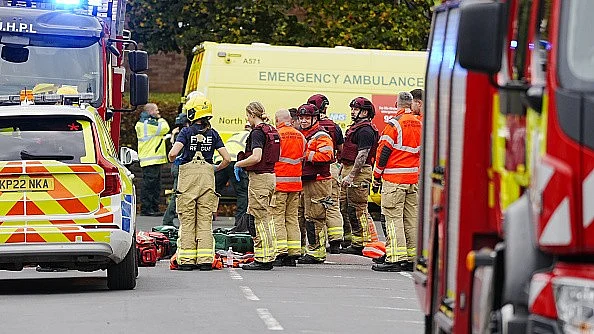One of two dead in Manchester synagogue attack may have died by police bullet
Fatal incident occurred as worshippers attempted to prevent attacker from storming synagogue and police shot at him

One of the two men killed in a car-and-knife assault on a synagogue in the UK city of Manchester may have died after being struck by a police bullet, law enforcement officials confirmed on Friday. The fatal incident occurred as worshippers attempted to prevent the attacker from storming the building.
Police identified the victims as local residents Adrian Daulby (53) and Melvin Cravitz (66). Both men were killed during Thursday’s attack on the Heaton Park Congregation Synagogue in Crumpsall, north Manchester. Three other people remain in hospital in a serious condition.
The assailant was shot dead by officers seven minutes after he drove a car into pedestrians outside the synagogue before launching a knife attack. He was also wearing what appeared to be a suicide belt, later discovered to be fake.
Greater Manchester police chief Stephen Watson said a forensic examination suggested one of the men who died had suffered a gunshot wound. “The attacker did not have a firearm, and this injury may sadly have been sustained as a tragic and unforeseen consequence of police action,” he explained. Watson added that one of the injured survivors also appeared to have been shot.
“It is believed that both victims were close together behind the synagogue door, as worshippers acted bravely to prevent the attacker from gaining entry,” Watson said.
The attack coincided with Yom Kippur, the holiest day in the Jewish calendar.
Chief Rabbi Ephraim Mirvis described the events as the outcome of “an unrelenting wave of Jew hatred” on Britain’s streets and online. “This is the day we hoped we would never see, but which deep down, we knew would come,” he wrote on social media.
Police named the suspect as 35-year-old Jihad Al-Shamie, a British citizen of Syrian origin who entered the UK as a child and was naturalised in 2006. Authorities said the name 'Al-Shamie' translates as 'the Syrian' and they remain uncertain whether it was his birth name.
The incident is being investigated as a terrorist attack. Home secretary Shabana Mahmood confirmed that Al-Shamie was “not previously known to police or to Prevent”, the government’s counter-radicalisation programme. “It’s too early to say whether the attacker acted alone or was part of a cell,” she added.
Three other people — two men in their 30s and a woman in her 60s — were arrested on Thursday on suspicion of preparing or committing acts of terrorism.
Neighbours in Prestwich, just a few miles from the synagogue, said Al-Shamie had lived locally for years. Several recalled seeing him exercise in his garden. Geoff Halliwell, a neighbour, described him as appearing to be “a straightforward, ordinary lad”.
Faith leaders and politicians were quick to denounce the assault and sought to reassure Britain’s 300,000-strong Jewish community.
Sarah Mullally, the newly named leader of the Church of England, called the attack “horrific violence” and a symptom of “hatred that rises up through fractures across our communities. Hatred and racism of any kind cannot be allowed to tear us apart”.
Greater Manchester Police announced that additional patrols would be deployed across the city through the weekend.
According to the Community Security Trust, antisemitic incidents in the UK have risen sharply since Hamas’ 7 October 2023 attack on Israel and the subsequent Gaza conflict. More than 1,500 incidents were reported in the first half of this year — the second-highest total ever recorded over a six-month period.
Prime Minister Keir Starmer and his wife Victoria visited the synagogue on Friday morning. Starmer condemned the “vile” perpetrator who “attacked Jews because they are Jews”. He vowed: “I will do everything in my power to guarantee you the security that you deserve. We will come together to wrap our arms around your community and show you that Britain is a place where you and your family are safe, secure and belong.”
Some political figures and Jewish leaders linked the attack to the atmosphere created by regular pro-Palestinian demonstrations, arguing that chants such as 'from the river to the sea, Palestine will be free' fuel hatred. Others, including Jewish participants in the protests, insisted their aim is to press for a ceasefire, alleviate suffering in Gaza, and secure the release of Israeli hostages held by Hamas.
Chief rabbi Mirvis urged the government to tighten its response: “You cannot separate the words on our streets, the actions of people in this way, and what inevitably results, which was yesterday’s terrorist attack.”
Home secretary Mahmood confirmed that 40 people were arrested during protests on Thursday evening, unrelated to the synagogue attack, but linked to demonstrations against Israel’s naval interception of the Sumud flotilla bound for Gaza. She criticised organisers, saying it was “dishonourable” not to cancel the rallies after the tragedy in Manchester.
Police in London also urged campaigners to abandon a planned protest on Saturday opposing the government’s decision to ban the group Palestine Action. Organisers have refused to call it off.
With AP/PTI inputs
Follow us on: Facebook, Twitter, Google News, Instagram
Join our official telegram channel (@nationalherald) and stay updated with the latest headlines
